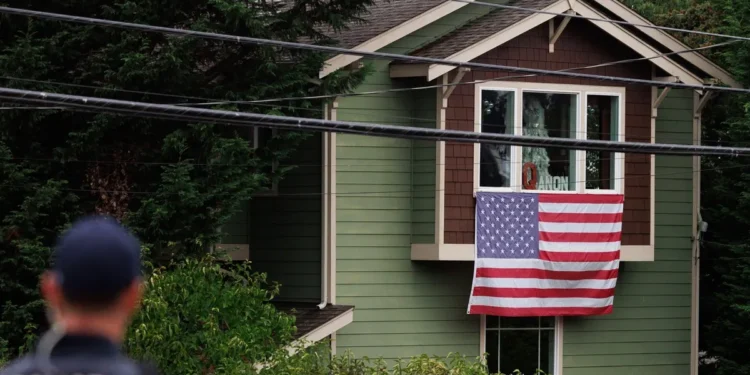King County prosecutors will not file criminal charges against a property manager who fatally shot a former doctor and QAnon follower outside her West Seattle home in October, determining he acted lawfully in self-defense when she threatened him with a loaded shotgun.
The October 1 shooting occurred when two men arrived at Tamara Towers’ Southwest Hudson Street residence to serve an eviction notice for the foreclosed property. Towers, 57, had participated in the January 6, 2021 Capitol attack and embraced QAnon conspiracy theories in her final years.
Senior Deputy Prosecuting Attorney Thomas O’Ban agreed with Seattle Police investigators’ conclusion that the 41-year-old Tacoma man was justified under state law after Towers pointed a shotgun at him and his colleague while threatening to shoot them.
The property manager fired twice, striking Towers in the chest and back, after she racked the shotgun’s slide and aimed it directly at him. Police found the weapon loaded with an unfired shell when they arrived within three minutes of the 911 call.
Towers’ sister, Tiffany Olsen, disputes the self-defense determination and believes her sister would be alive if the men had received de-escalation training. The family suspects Seattle police dismissed the case too quickly due to Towers’ extreme political beliefs.
“They found it easier to believe she was this extremist cuckoo who deserved to die, rather than the incredible person she was,” Olsen said. The family lacks resources to pursue a wrongful death lawsuit.
Towers’ transformation from accomplished physician to conspiracy theorist reflected the devastating progression of multiple sclerosis, which caused neurological damage affecting her judgment and behavior, according to family members.
A University of Washington School of Medicine graduate who once lived by the Hippocratic oath to “do no harm,” Towers voluntarily resigned from Swedish Health Services in 2015 when her rapidly progressing neurological condition began affecting her medical judgment.
Her condition deteriorated alongside her embrace of QAnon theories claiming satanic pedophiles were undermining Donald Trump through “deep state” operations. Family members described increasing paranoia, delusions, and erratic behavior that eventually estranged her from relatives.
The Washington Medical Commission suspended Towers’ medical license in January 2022 after she failed to respond to orders for mental health evaluation following complaints about her January 6 participation.
Neighbors reported Towers exhibited increasingly paranoid behavior, using binoculars to watch aircraft she believed were surveilling her and covering windows with cardboard at night. She displayed large “Q” letters throughout her home, visible from the street.
Towers had refused to vacate the $1.2 million home after foreclosure for failing to make $24,000 in mortgage payments while owing over $225,000. The new owner’s attempts to serve eviction papers prompted threatening text messages from Towers accusing him of conspiring with “hostile foreign agents.”
Concerned about Towers’ instability after speaking with her ex-husband, the property owner brought his armed property manager as a witness for the October 1 visit.
When the men arrived, Towers descended her staircase carrying a shotgun, pressed its barrel against a front window, then opened the door declaring “I’m going to shoot you.” The property manager, feeling trapped with no escape route, drew his legally carried handgun and fired when she aimed the weapon at him.
Police investigators found extensive QAnon paraphernalia throughout the home, including folders labeled “Q Mapping Project” and warning signs about ammunition costs and Second Amendment protection. The phrase “do it Q” was painted in large letters on her backyard grass.
Evidence from a 2023 incident in Bozeman, Montana, showed Towers had previously threatened city employees with execution and brandished a shotgun at utility workers, leading to a ban from City Hall.
O’Ban’s prosecutorial review concluded the shooting represented “indisputably tragic, but also insurmountably an apparent use of lawful force,” noting the property manager had legitimate reasons to be present and reasonable fear for his life.
The case highlights the intersection of mental health deterioration, political extremism, and firearms access in contemporary America, while raising questions about intervention strategies for individuals experiencing severe psychological decline.







